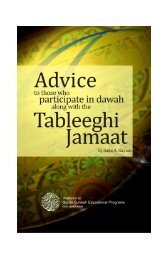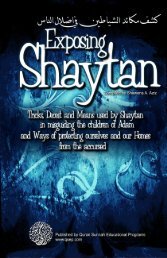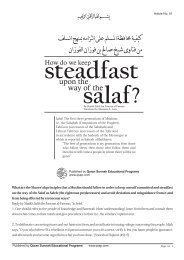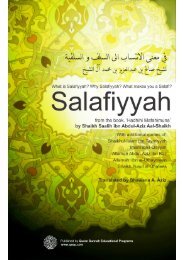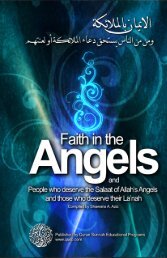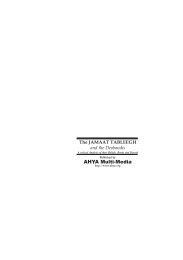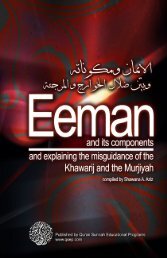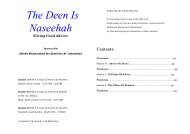Worldly Difficulties - Reality, Causes and Benefits Published ... - QSEP
Worldly Difficulties - Reality, Causes and Benefits Published ... - QSEP
Worldly Difficulties - Reality, Causes and Benefits Published ... - QSEP
You also want an ePaper? Increase the reach of your titles
YUMPU automatically turns print PDFs into web optimized ePapers that Google loves.
<strong>Worldly</strong><br />
<strong>Difficulties</strong><br />
<strong>Reality</strong><br />
<strong>Causes</strong><br />
<strong>Benefits</strong><br />
Consolation<br />
for the<br />
Grieving Heart<br />
Compiled by Shawana A.Aziz<br />
<strong>Published</strong> by Quran Sunnah Educational Programs<br />
www.qsep.com
Contents<br />
About the Book................................................................01<br />
Life of the world is a trial......................................................02<br />
Complete trust in Allah’s decision........................................03<br />
Whatever happened to you, could not have missed you.........06<br />
Afflictions are a form of blessing..........................................08<br />
The believer should not wish for calamities...........................11<br />
If Allah grants ease…...........................................................13<br />
Blessing or Punishment?.....................................................14<br />
Towards achieving Allah’s Pleasure <strong>and</strong> Blessings<br />
a) Sabr...........................................................................15<br />
b) Ihtisaab.....................................................................17<br />
c) Istirja.........................................................................19<br />
Shakwah (complaining)......................................................21<br />
Another aspect of worldly difficulties..................................22<br />
Calling upon Allah Alone in times of affliction.....................24<br />
Distinguishing between trial <strong>and</strong> punishment.....................28
About the<br />
Book<br />
<strong>Worldly</strong> difficulties are an<br />
inevitable part of life; they range<br />
from simple problems to fatal<br />
diseases <strong>and</strong> loss of loved ones.<br />
This booklet helps the reader see<br />
his arduous affairs in their appropriate perspectives by encouraging<br />
complete trust in Allah’s Decisions, <strong>and</strong> by defining the great<br />
principle of al-Qadha wal-Qadar (Predestination) that, ‘Whatever<br />
happened to you, could not have missed you.’<br />
This booklet reminds the reader that worldly difficulties are<br />
a trial for the believers, while not disregarding the fact that more<br />
often afflictions result from one’s sins <strong>and</strong> disobedience to Allah.<br />
This booklet also teaches how appropriate behavior <strong>and</strong><br />
correct attitude can change an adversity into a worthwhile<br />
opportunity to achieve Allah’s Pleasure through Sabr, Shukr,<br />
Ihtisaab <strong>and</strong> Istirja, whereas impatience, panic <strong>and</strong> complaining can<br />
worsen one’s state of affairs.<br />
Finally, this booklet explains the futility of invoking the<br />
Prophets <strong>and</strong> the dead to remove hardships, <strong>and</strong> encourages calling<br />
upon Allah Alone to ease one’s affairs.<br />
I hope that this booklet will bring solace <strong>and</strong> comfort to<br />
people as they struggle to manage the difficulties of life. I ask Allah to<br />
accept this humble effort <strong>and</strong> all success is from Allah.<br />
- 01 -<br />
Shawana A. Aziz
Life<br />
of the world<br />
trial<br />
is a<br />
- 02 -<br />
Disbelievers see afflictions as mere inconvenience; but for the<br />
believers, hardships are a trial <strong>and</strong> an opportunity to strengthen one’s<br />
bond with the Lord. Allah, the Exalted, tests His slaves with calamities<br />
<strong>and</strong> blessings. If the believer endures the calamity with patience, Allah,<br />
the All Merciful, rewards him abundantly, expiates his sins <strong>and</strong> elevates<br />
his ranks in Jannah. “Surely We will test you with fear, hunger, loss of<br />
wealth <strong>and</strong> life <strong>and</strong> the fruits of your work, but give glad tidings to the<br />
patient - those who, when afflicted with a calamity say, ‘to Allah we<br />
belong <strong>and</strong> to Him we shall return.’ Those are the ones upon whom are<br />
bestowed blessings <strong>and</strong> mercy from their Lord, <strong>and</strong> those are the ones<br />
who are (truly) guided.” [Soorah al-Baqarah (2): 155]<br />
On the other h<strong>and</strong>, disbelievers are truly at a loss because they<br />
have no hope of being rewarded for their perseverance or patience. Allah<br />
says, “...if you are suffering (hardships) then surely, they (too) are<br />
suffering (hardships) as you are suffering, but you have a hope from<br />
Allah (for the reward, i.e. Paradise) that for which they hope not…”<br />
[Soorah an-Nisa (4): 104]<br />
The following pages define in light of the Qur’aan <strong>and</strong> the guidance of<br />
Allah’s Messenger how a believer can reap the most benefit from<br />
his hardships through appropriate behavior <strong>and</strong> attitude.
trust<br />
Complete<br />
in Allah’s<br />
decision<br />
It is an integral part of a Muslim's Faith (Eemaan) to believe that<br />
everything Allah chooses for him; good or evil, pleasure or affliction,<br />
is for the slave's benefit. The Messenger of Allah said, “By Him, in<br />
Whose H<strong>and</strong> is my soul, Allah does not ordain a Decree for a believer<br />
but for his good; <strong>and</strong> this merit is for no one except a believer...”<br />
[Saheeh Muslim]<br />
It is beyond human underst<strong>and</strong>ing to completely<br />
comprehend the Divine Wisdom behind every affliction because our<br />
knowledge is limited only to the apparent event. Allah Alone knows<br />
how things will turn out in the end, <strong>and</strong> how it will benefit the slave.<br />
So, the calamity that appears to be evil may lead to many favorable<br />
benefits. Allah says in the Qur'aan, “…it may be that you dislike a<br />
thing which is good for you <strong>and</strong> that you like a thing which is bad for<br />
you. Allah knows (what is best for you) <strong>and</strong> you do not.” [Soorah al-<br />
Baqarah (2): 216]<br />
One must therefore, always expect good from Allah <strong>and</strong><br />
trust His Decision <strong>and</strong> Judgment with regard to every aspect of his<br />
life. Allah has promised that if the believers show reliance in their<br />
Lord, then Allah will suffice them, “Whoever trusts in Allah, will find<br />
- 03 -
Him sufficient. Verily, Allah will accomplish His purpose.” [Soorah<br />
at-Talaq (65): 3]<br />
The Qur'aan gives us the example of Prophet Yaqub's <br />
strong trust in Allah. He had very h<strong>and</strong>some children. When he<br />
sent his children to Egypt; he instructed them to enter Egypt<br />
through different gates because he feared evil eye for them. “And he<br />
said, ‘O my son! Do not enter by one gate, but enter by different<br />
gates…” <strong>and</strong> then he says, “…I cannot avail you against Allah.<br />
The decision rests only with Allah. I put my trust in Him alone, <strong>and</strong><br />
all who trust should only trust Him.” [Soorah Yusuf (12): 67]<br />
Meaning although my precaution cannot prevent Allah's Decision<br />
<strong>and</strong> appointed Decree; I trust in Allah that whatever He chooses will<br />
be the best.<br />
The Messenger of Allah explained that the believer should<br />
always be satisfied with the Decree of Allah. He should be pleased<br />
<strong>and</strong> thankful to Allah when he is granted ease <strong>and</strong> pleasure of life,<br />
<strong>and</strong> he should practice patient when calamities afflict him. He <br />
said, “…If he (the believer) is granted ease of living, he is thankful;<br />
<strong>and</strong> this is best for him. And if he is afflicted with a hardship, he<br />
perseveres; <strong>and</strong> this is best for him.” [Saheeh Muslim]<br />
It is prohibited to show impatience, or extreme excitement,<br />
anger, or do actions or say words which might show dissatisfaction<br />
with Allah's Decree, like wailing, tearing clothes, slapping cheeks,<br />
etc. One will be held accountable on the Day of Judgment for all<br />
prohibited acts that he is capable of avoiding. Imam al-Bukharee<br />
(rahimahullah) has recorded in his Saheeh from Abu Musa al-<br />
Ansari that the Prophet has declared himself free from him who<br />
wails at the time of affliction, one who shaves the head at the time of<br />
affliction (as an act of expressing grief), <strong>and</strong> the one who tears<br />
clothes at the time of affliction. All such acts are forbidden according<br />
to the consensus of the scholars.<br />
- 04 -
Allah, however, does not punish His slaves for actions that<br />
are beyond his control. For example, one does not have much<br />
control over tears <strong>and</strong> emotions of the heart. One may experience<br />
sorrow <strong>and</strong> grief due to loss of something cherished or departure of<br />
one's beloved. Allah will not punish the slave for the tears <strong>and</strong><br />
sorrow of the heart, but it is necessary for the slave to dislike every<br />
evil thought that crosses his mind <strong>and</strong> prevent the tongue from<br />
saying anything which may express displeasure with Allah's Decree.<br />
Allah’s Messenger visited his companion, Sa'd Ibn Ubadah, who<br />
was ill <strong>and</strong> along with him were some of his Companions. Allah’s<br />
Messenger wept on seeing Sa'd Ibn Ubadah <strong>and</strong> when the others<br />
saw him weep they also wept. The Prophet then said, “Listen! Allah<br />
does not punish due to the tears of the eyes or the sorrow of the<br />
heart, but He punishes because of this (<strong>and</strong> he pointed to his<br />
tongue) or He shows mercy.” [Saheeh al-Bukharee]<br />
When Ibraheem, the son of Allah's Messenger , was at his<br />
last breath, he went to him <strong>and</strong> his eyes filled with tears. Abdur-<br />
Rahman Ibn Auf said to him, “Even you, O Messenger of Allah <br />
(weep)!” The Prophet replied, “O Ibn Auf, it is mercy.” Then he wept<br />
some more, <strong>and</strong> said, “The eye weeps <strong>and</strong> the heart sorrows <strong>and</strong> we<br />
do not say anything except what is pleasing to our Lord. By your<br />
leaving, O Ibraheem, we are sorrowed.” [Saheeh al-Bukharee]<br />
- 05 -
happened<br />
whatever<br />
to you<br />
could not have<br />
missed<br />
you<br />
Nothing takes place on earth, except that it is inscribed in al-Lawh<br />
al-Mahfoodh or ‘the Preserved Tablet,’ where Allah, the Exalted, has<br />
recorded everything about the creation; livelihood, provisions, ages,<br />
deeds, etc. The Messenger of Allah said, “Allah had written the<br />
ordained measures (<strong>and</strong> due proportions) of the creation, fiftythous<strong>and</strong><br />
years before the creation of the Heavens <strong>and</strong> the Earth...”<br />
[Saheeh Muslim]<br />
Similarly, every calamity that befalls the slave has been preordained<br />
by Allah. “No disaster strikes upon the earth or within<br />
yourselves but was recorded in a Book (al-Lawh al-Mahfoodh) before<br />
We bring it into existence. Verily, this is easy for Allah…” [Soorah<br />
Hadid (57): 22-23]<br />
Allah states the wisdom behind pre-ordainment (in the next<br />
verses of Soorah Hadid) that the slave should neither despair if<br />
calamity afflicts, nor become proud <strong>and</strong> haughty on achieving good;<br />
because every calamity that befalls him was previously designated<br />
for him <strong>and</strong> all blessings are due to Allah’s Favor <strong>and</strong> Mercy. So,<br />
- 06 -
whatever reached him could not have missed him <strong>and</strong> whatever<br />
missed him could not have reached him. This belief is an essential<br />
part of Eemaan (faith), when Allah's Messenger was asked: “What<br />
is Eemaan?” He replied, “Eemaan is to believe in Allah, His Angels,<br />
His Books, His Messengers, the Last Day <strong>and</strong> to believe in<br />
Predestination; the good <strong>and</strong> the bad.” [Agreed upon]<br />
The slave should also refrain from over speculation <strong>and</strong><br />
conjecture, like saying, ‘If I had done such <strong>and</strong> such… the result<br />
would have been different…’ or ‘…I would have been saved from this<br />
calamity...’ etc. The Messenger of Allah said, “…<strong>and</strong> if anything (in<br />
the form of trouble) comes to you, don't say, ‘if I had not done that, it<br />
would not have happened so <strong>and</strong> so,’ but say, Allah did what He had<br />
ordained <strong>and</strong> your ‘if’ opens the gate for Shaytan.” [Saheeh Muslim<br />
(6441)]<br />
Allah, the Exalted, has promised to grant tranquility <strong>and</strong><br />
guide the hearts of the believers if they refrain from speculation.<br />
Allah says, “No disaster strikes except by Allah's Permission, <strong>and</strong><br />
whoever believes in Allah, He guides his heart, Allah is the Knower of<br />
all things.” [Sorah Taghabun (64):11] Ibn Abbas said Allah's<br />
guiding the heart of the slave means that Allah will guide his heart to<br />
certainty. Therefore, he will know that what reached him would not<br />
have missed him, <strong>and</strong> what has missed him would not have reached<br />
him. [Tabari 23:421]<br />
Imam Ibn Katheer (rahimahullah) writes in his Tafseer,<br />
“…after suffering from an affliction, if the slave believes that it<br />
occurred by Allah’s Judgment <strong>and</strong> Decree, <strong>and</strong> he patiently abides,<br />
awaiting Allah's reward, then Allah guides his heart <strong>and</strong> will<br />
compensate him for his loss in this life by granting guidance to his<br />
heart <strong>and</strong> certainty in faith. Allah will replace whatever he lost with<br />
the equal or what is better.”<br />
- 07 -
Afflictions<br />
blessing<br />
are a<br />
form of<br />
- 08 -<br />
Apart from some hardships, afflictions also bring about various<br />
benefits for the believer. Recognizing them makes easy the path of<br />
patience <strong>and</strong> endurance for the believer;<br />
<br />
<br />
Hardships teach the believer to be patient <strong>and</strong> Allah abundantly<br />
rewards His patient slaves.<br />
Sufferings remind the sinful believer about the greatest affliction<br />
of life, i.e. death, which may afflict him at any moment. It<br />
reminds him of the severe punishments, which may follow<br />
next, as a result of his disobedience to Allah.<br />
When one deviates, he seldom pays any heed to the advice<br />
of others; but when calamity strikes, he is reminded of Allah<br />
<strong>and</strong> His severe punishments. Allah says, “We will make<br />
them taste a lesser punishment before the greater<br />
punishment that perhaps they may return (to the right<br />
path).” [Soorah as-Sajdah (32): 2] So, calamities give one the
time to reflect over one’s sins <strong>and</strong> their awful outcome. As a<br />
result, one recognizes his errors <strong>and</strong> returns to Allah in<br />
repentance; worldly difficulties thus, serve as a blessing for<br />
the sinful.<br />
Hardships reduce the burden of sins from the believer freeing him<br />
from the severe <strong>and</strong> unbearable punishments of the Hereafter.<br />
The Messenger of Allah said, “Afflictions continue to befall<br />
believing men <strong>and</strong> women in their body, family <strong>and</strong> property,<br />
until they meet Allah burdened with no sins.” [as-Saheehah<br />
(2280)] <strong>and</strong> he also said, “No stress or exhaustion befalls the<br />
Muslim, nor worry or distress, even a thorn which pricks him,<br />
but Allah will expiate his sins because of that.” [Agreed upon]<br />
Suffering in this world is insignificant in comparison to the<br />
harsh unbearable punishments of the Hereafter. Besides,<br />
death puts an end to a person’s suffering in this world,<br />
whereas punishments of the Hereafter are eternal!<br />
Moreover, Allah forgives most of our disobedience in the<br />
world, <strong>and</strong> what we suffer of the hardships is a retribution for<br />
only a fraction of our sins. Allah, the All-Merciful, informs us<br />
in the Qur’aan, “Whatever befalls you is a result of what your<br />
h<strong>and</strong>s have earned. And He (Allah) pardons much.” [Soorah<br />
ash-Shura (42): 30]<br />
If we were to be punished for all of our evil deeds, everything<br />
on the Earth be destroyed. Allah says in Soorah Fatir, “if Allah<br />
were to punish men for that which they earned, He would not<br />
leave a moving (living) creature on the face of the Earth, but<br />
He gives respite for an appointed term…” [Soorah Faatir (35):<br />
45]<br />
So, it is from the immense Mercy of Allah that He pardons<br />
- 09 -
much of our evil deeds <strong>and</strong> He has made the afflictions of this<br />
life an atonement for the harsh <strong>and</strong> severe punishments of the<br />
Hereafter. Allah's Messenger said: “When Allah wills good for<br />
a servant of His, He expedites his punishments in this life, <strong>and</strong><br />
when He wills retribution for a servant of His, He holds his sins<br />
for him to judge him by them on the Day of Judgment.” [Saheeh<br />
al-Jamee (308)]<br />
Hardships establish submission <strong>and</strong> humbleness in the believer;<br />
for instance, when afflicted with sickness, the slave realizes his<br />
weakness <strong>and</strong> need for Allah; <strong>and</strong> he invokes His Lord for good<br />
health; <strong>and</strong> after having been granted fitness, he becomes<br />
thankful to His Lord for alleviating his hardships <strong>and</strong> strives<br />
harder in worshiping Him.<br />
Had he always lived a healthy life without having<br />
experienced any difficulty or hardship, he would have grown<br />
arrogant <strong>and</strong> proud. Likewise, if he were to be ill all the time, he<br />
would not have had the opportunity to worship Allah <strong>and</strong> be<br />
grateful to Him.<br />
These <strong>and</strong> many other benefits of worldly difficulties together bring<br />
about numerous blessings for the believer. Besides, worldly<br />
difficulties are necessary for the spiritual growth of the believer since<br />
they purify him from sins, help him worship Allah sincerely <strong>and</strong><br />
establish his Deen (religion). It is for this reason that the Prophets <br />
<strong>and</strong> their followers were pleased when afflicted with hardships.<br />
Allah's Messenger said, “The Prophets are afflicted the most, then<br />
the righteous. Indeed, one of them would be tested with poverty, so<br />
that he would not be able to wear anything except a coarse cloak.<br />
And indeed, they used to be pleased with affliction as you are with<br />
comfort.” [as-Saheehah (144)]<br />
- 10 -
eliever<br />
The<br />
should NOT<br />
wish for<br />
calamites<br />
It might seem appropriate to wish <strong>and</strong> endure worldly difficulties in<br />
return for the various benefits, rewards <strong>and</strong> freedom from the<br />
punishments of the Hereafter; but the believer is prohibited from<br />
wishing for calamities.<br />
Firstly because one is likely to fall into ingratitude <strong>and</strong><br />
disbelief at the time of difficulties. Moreover, it is not possible for<br />
anyone to endure the punishment of his sins in this life.<br />
Secondly, wishing for calamities would conflict with the easy<br />
<strong>and</strong> forgiving nature of Islam. We are instructed to ask for our well<br />
being <strong>and</strong> forgiveness. Allah, the Exalted, has taught this prayer in<br />
the Qur'aan,<br />
- 11 -
“Our Lord! Punish us not if we forget or fall into error,<br />
Our Lord! Lay not on us a burden like that which You did lay<br />
on those before us (Jews <strong>and</strong> Christians);<br />
Our Lord! Put not on us a burden greater<br />
than we have strength to bear.<br />
Pardon us <strong>and</strong> grant us Forgiveness. Have mercy on us.”<br />
[Soorah al-Baqarah (2): 286]<br />
So, the believer should take advantage of Allah's Mercy <strong>and</strong> ask His<br />
forgiveness. Anas reported that Allah's Messenger once visited a<br />
Muslim man who was so weak that he was (thin) like a chicken, as<br />
described in the Hadeeth. Allah's Messenger asked him, “Did you<br />
make a specific supplication or ask Allah for something (because of<br />
which you became like this)?” He replied, “Yes, I used to say, ‘O<br />
Allah! Whatever punishment you have for me in the Hereafter,<br />
expedite it for me in this life.” Allah's Messenger said, “Exalted be<br />
Allah! You cannot withst<strong>and</strong> that. Instead, you should have said,<br />
“Our Lord, grant us good in this life <strong>and</strong> in the next life,<br />
<strong>and</strong> protect us from the punishment of the Fire.”<br />
[Soorah al-Baqarah (2): 201]<br />
He then implored Allah to cure him, <strong>and</strong> Allah cured him.”<br />
[Saheeh Muslim]<br />
- 12 -
grants<br />
If Allah<br />
ease...<br />
The believer should be thankful to Allah if he is granted ease <strong>and</strong><br />
comfort. However, one should not deem ease of life to be a result of<br />
one’s piety <strong>and</strong> righteousness because worldly difficulties are not<br />
the only trials of the world. Rather, prosperity, wealth <strong>and</strong> well being<br />
are also part of the test. Allah says, “...And We shall make a trial of<br />
you with evil <strong>and</strong> with good...” [Soorah al-Ambiya (21): 35] meaning,<br />
We shall test you sometimes with difficulties <strong>and</strong> sometimes with<br />
ease, to see who will give thanks <strong>and</strong> who will be ungrateful, who will<br />
be patient <strong>and</strong> who will despair.<br />
Ali Ibn Abi Talib reported from Ibn Abbas that Allah will<br />
test you with difficulties <strong>and</strong> with times of prosperity, with health<br />
<strong>and</strong> sickness, with richness <strong>and</strong> poverty, with lawful <strong>and</strong> unlawful,<br />
obedience <strong>and</strong> sin, with guidance <strong>and</strong> misguidance.” [See Tafseer<br />
Ibn Katheer]<br />
- 13 -
lessing<br />
or<br />
punishment<br />
While patience <strong>and</strong> submission in times of difficulty can bring<br />
rewards <strong>and</strong> blessings for the believer; displeasure <strong>and</strong> impatience<br />
can incur Allah’s Wrath <strong>and</strong> Punishment on the slave. Allah’s<br />
Messenger said, “The magnitude of the reward is in accordance<br />
with the magnitude of the affliction. When Allah loves some people,<br />
He afflicts them. He who is then content (with Allah’s Decree) will<br />
achieve the acceptance (of Allah); <strong>and</strong> he who is dissatisfied (with<br />
Allah’s Decree) will attain the anger (of Allah).” [Saheehah (146)] So,<br />
it rests upon the slave; either he seizes the opportunity of achieving<br />
Allah’s Pleasure or faces misery.<br />
- 14 -
Towards achieving<br />
Allah’s Pleasure<br />
<strong>and</strong> Blessing<br />
Sabr<br />
'Sabr' is an Arabic word coming from a root that means, ‘to detain,<br />
refrain <strong>and</strong> stop.’ In the Islamic terminology, 'Sabr' means, ‘to stop<br />
oneself from despairing <strong>and</strong> panicking; to stop the tongue from<br />
complaining, <strong>and</strong> to stop the h<strong>and</strong>s from striking the face <strong>and</strong><br />
tearing the clothes at a time of grief <strong>and</strong> distress.’<br />
Those who possess the quality of 'Sabr' are indeed blessed,<br />
for Allah's Messenger is reported to have said, “No one is given<br />
anything better <strong>and</strong> more encompassing than patience.” [Saheeh al-<br />
Bukharee]<br />
Allah, the Exalted, has promised for the Saabiroon (those<br />
who show Sabr) abundant reward that will not be weighed or<br />
measured! He said, “Only those who are patient shall receive their<br />
rewards in full, without reckoning.” [Soorah az-Zumar (39): 10]<br />
True Sabr that will bring about the promised reward has to<br />
be practiced at the beginning of the calamity, when one first hears<br />
the news of affliction. In spite of the heart’s sorrows, the slave does<br />
not panic or despair. He exhibits patience <strong>and</strong> satisfaction with the<br />
Decree of Allah.<br />
- 15 -
Patience after the initial shock when the grief has reduced is<br />
not true Sabr. The real test of patience is at the time when one is<br />
grieved by the calamity. The Prophet said, “Verily patience is at the<br />
first hit (of news).” [Saheeh al-Bukharee]<br />
Every person practices patience, willingly or unwillingly.<br />
The wise person is he who practices patience willingly <strong>and</strong> from the<br />
beginning because he underst<strong>and</strong>s the benefits of patience. He<br />
knows that he will be rewarded for his patience <strong>and</strong> will be criticized<br />
if he panics. He is aware that impatience <strong>and</strong> despair can neither<br />
bring back missed opportunities nor change the Decree of Allah.<br />
Foolish is he who practices patience only after having<br />
complained <strong>and</strong> shown anguish <strong>and</strong> he cannot find any other<br />
choice. Sabr at this point does no good.<br />
- 16 -
Towards achieving<br />
Allah’s Pleasure<br />
<strong>and</strong> Blessing<br />
Ihtisaab<br />
‘Looking forward to Allah’s reward <strong>and</strong> forgiveness for every<br />
affliction, regardless of the pain <strong>and</strong> suffering’ is called Ihtisab.<br />
Allah's Messenger said, “When Allah takes away from His believing<br />
servant his beloved one of the people of the earth; if he displays<br />
patience <strong>and</strong> Ihtisab, Allah will then not accept any reward for him<br />
less than Jannah (Paradise).” [Saheeh al-Bukharee]<br />
Let us take the example of Aasiyah, the wife of Firawn.<br />
Aasiyah was severely tortured by her husb<strong>and</strong>, who was a king,<br />
because she had accepted the Oneness of Allah. In spite of the<br />
severe anguish <strong>and</strong> pain, Aasiyah persisted in her faith, displayed<br />
immense patience <strong>and</strong> practiced Ihtisab. She prayed to Allah <strong>and</strong><br />
asked Him for a home in Paradise. Allah mentions her story in the<br />
Qur'aan, “And Allah has set forth an example for those who believe,<br />
the wife of Firawn, when she said, “My Lord! Build for me a home<br />
with You in Paradise <strong>and</strong> save me from Firawn <strong>and</strong> his work, <strong>and</strong><br />
save me from the people who are wrongdoers.” [Soorah at-Tahrim<br />
(66): 11]<br />
- 17 -
When she invoked Allah with this du’a, the sky opened for<br />
her <strong>and</strong> she saw her home in Paradise. She smiled. Firawn<br />
comm<strong>and</strong>ed a big rock to be brought <strong>and</strong> dropped on Aasiyah in<br />
order to crush her to death. But Allah took her soul before the rock<br />
was dropped. So, Allah granted Aasiyah two blessings for her<br />
Ihtisab; a home in Paradise <strong>and</strong> protection from the cunning plans<br />
of Firawn. She is thus an example for all those who will come after<br />
her until the Day of Judgment. [See at-Tabari 23: 500]<br />
- 18 -
Towards achieving<br />
Allah’s Pleasure<br />
<strong>and</strong> Blessing<br />
Istirja<br />
Expressing Allah's Lordship <strong>and</strong> submission to His Decree by<br />
words, i.e. saying,<br />
َ<br />
‘Indeed, we belong to Allah,<br />
<strong>and</strong> indeed to Him we shall return.'<br />
Allah says, “Surely, We will test you with fear, hunger, loss of wealth<br />
<strong>and</strong> life <strong>and</strong> the fruits of your work but give glad tidings to the<br />
patient - those who, when afflicted with a calamity say, “Inna lillahi<br />
wa Inna Ilaihi Raji'un.” Those are the ones upon whom are bestowed<br />
blessings <strong>and</strong> mercy from their Lord, <strong>and</strong> those are the ones who are<br />
(truly) guided.” [Soorah al-Baqarah (2): 155-7]<br />
Umm Salamah (radhi allahu anha) reported that she heard<br />
Allah's Messenger say, “Whenever an affliction strikes a believer<br />
<strong>and</strong> he says,<br />
- 19 -
“ Inna lillahi wa Inna Ilaihi Raji’un.<br />
Allahum majurni fi musibati wakhluf li khayran minha.”<br />
“Indeed, we belong to Allah,<br />
<strong>and</strong> indeed to Him we will return.<br />
O Allah! Reward me for my calamity,<br />
<strong>and</strong> replace it for me that which is better.”<br />
Allah will surely reward him for it <strong>and</strong> replace it for him with a better<br />
thing.” Umm Salamah (radhi allahu anha) added, “So, when Abu<br />
Salamah (her husb<strong>and</strong>) died, Allah enabled me to say this (du’a),<br />
<strong>and</strong> He replaced him for me with Allah's Messenger .” [Saheeh<br />
Muslim]<br />
- 20 -
Shakwah<br />
Shakwah (complaining) falls into two categories;<br />
(a) The first type is to complain to Allah <strong>and</strong> this does not contradict<br />
patience. A number of examples of Shakwah to Allah can be<br />
found in the Qur'aan, one of which is the complaining of Yaqub<br />
, who said, “I complain of my distraction <strong>and</strong> anguish to<br />
Allah.” [Soorah Yusuf (12): 86]<br />
(b) The second type of Shakwah involves complaining to people,<br />
either directly through words or indirectly through the way we<br />
look <strong>and</strong> behave, like dressing shabbily, shaving the head,<br />
displaying distress, etc. all in order to show one’s grief <strong>and</strong> pain.<br />
This type of Shakwah is contradictory to Sabr because it<br />
implies disagreeing with Allah’s Decree <strong>and</strong> lack of trust in Him.<br />
One may, however, mention his suffering to some people<br />
like close friends. Ibn Mas’oud reported that he visited the<br />
Prophet when he was sick; he touched him with his h<strong>and</strong>,<br />
<strong>and</strong> felt the fever. He said, “You have a severe fever.” He replied,<br />
“Yes, I suffer from fever as much as would two men among you!”<br />
[Agreed upon]<br />
- 21 -
another<br />
aspect<br />
of worldly difficulties!<br />
We underst<strong>and</strong> from the discussions on the previous pages<br />
that worldly difficulties are a trial, during which the believer is required<br />
to be patient <strong>and</strong> submit to Allah’s Decree. But more often afflictions<br />
are also a result of the believer’s sins <strong>and</strong> evil deeds. They are a<br />
punishment from Allah <strong>and</strong> a warning to shun evil deeds <strong>and</strong> return<br />
back to Allah in repentance. “Whatever of misfortune befalls you is a<br />
result of what your h<strong>and</strong>s have earned.” [Soorah ash-Shura (42): 30]<br />
It is very important to clearly underst<strong>and</strong> this aspect of worldly<br />
difficulties <strong>and</strong> give it due consideration. The Qur’aan is a witness that<br />
Allah severely punished <strong>and</strong> subsequently destroyed the past nations<br />
who did not pay heed to His admonitions <strong>and</strong> warnings. He punished<br />
the disbelievers at the time of Noah with a terrible flood. He decided<br />
to send an awful wind storm upon the people of Hud as a penalty. A<br />
disastrous earthquake destroyed the arrogant at the time of Salih .<br />
The people of Lut were turned upside down <strong>and</strong> stones of baked clay<br />
rained on them … These <strong>and</strong> other stories of the past nations warn us<br />
about the bad consequences of disobeying Allah <strong>and</strong> disregarding His<br />
admonitions, Allah says, “Let those who contradict his (the Messenger's<br />
- 22 -
) comm<strong>and</strong> beware of a trial or a severe punishment.” [Soorah an-Nur<br />
(24): 63]<br />
Punishments can be in various forms. Perhaps, today what<br />
seems the most obvious punishment afflicting mankind is AIDS, which<br />
appeared for the first time in the 80’s. AIDS is a fatal disease that<br />
weakens the resistance of body <strong>and</strong> makes it defenseless against all<br />
kinds of infections. Anyone who develops AIDS dies within a few years.<br />
AIDS is spread mainly due to indiscriminate sexual activity,<br />
homosexuality <strong>and</strong> drug abuse, all of which are actions that transgress<br />
the limits of Allah.<br />
Some may argue that AIDS is not limited to sinful people but<br />
has also spread among the chaste individuals. The Qur'aan gives the<br />
reply that when the punishment of Allah befalls, it does not only besiege<br />
the sinful, but afflicts the society as a whole. Allah says, “Beware of a<br />
trial which will not afflict only the sinful among you, <strong>and</strong> know that<br />
Allah is severe in punishment.” [Soorah Anfal (8): 25]<br />
AIDS is only one in the series of calamities <strong>and</strong> adversities<br />
afflicting mankind. Today, we hear of a number of diseases, unexpected<br />
storms, floods <strong>and</strong> earthquakes afflicting different parts of the world.<br />
Punishing reminders also come in the form of oppression from the<br />
enemy. This is a result of our disobedience to Allah that we are<br />
surrounded by hardships <strong>and</strong> adversities.<br />
Allah is warning us. Know that the only solution is to refrain<br />
from violating the laws of Allah <strong>and</strong> restricting oneself within the<br />
bounds of Islam. The Qur'aan says, “Corruption has appeared on the<br />
l<strong>and</strong> <strong>and</strong> in the sea because of what man's h<strong>and</strong>s have earned in order<br />
that (Allah) may make them taste a part of what they have done, <strong>and</strong> in<br />
order that they may return (to the right path).” [Soorah ar-Rum (30):41]<br />
We should greatly consider these warnings <strong>and</strong> hasten towards<br />
repentance, <strong>and</strong> depart from all such acts, which may become the<br />
cause of our destruction. We should work towards righteousness <strong>and</strong><br />
please our Lord before it is too late - <strong>and</strong> before we get caught up in<br />
punishments that become difficult for us to escape.<br />
- 23 -
Calling<br />
upon<br />
alone<br />
Allah<br />
in times of afflictions<br />
How unfortunate are those who, when afflicted with difficulty <strong>and</strong><br />
hardship run towards tombs <strong>and</strong> graves in search of help <strong>and</strong> relief.<br />
They are found invoking the Prophets <strong>and</strong> the dead to dispel<br />
hardships. Allah says about them, “And who is more astray than<br />
one who calls (invokes) besides Allah, such as will not answer him<br />
till the Day of Resurrection, <strong>and</strong> who are (even) unaware of their calls<br />
(invocations) to them?” [Soorah al-Ahqaf (46): 5]<br />
It would be enough to mention only one Hadeeth of Allah's<br />
Messenger to prove the futility of their action. Allah's Messenger <br />
said, “Those who are most afflicted among the people are the<br />
Prophets, then the best, then the (next) best. One is afflicted in<br />
accordance with (the strength of) his Deen. If his Deen is firm, his<br />
affliction is hard, <strong>and</strong> if his Deen is weak, his affliction is light.<br />
Indeed, one would be so much subjected to adversity until he walks<br />
among the people without any sin.” [Saheeh al-Jamee (993)]<br />
Apart from explaining that Prophets are afflicted the most,<br />
then the best <strong>and</strong> then the best, this Hadeeth is a proof of Tawheed<br />
(Oneness of Allah). If one knows that the Prophets <strong>and</strong> the righteous<br />
- 24 -
people are also afflicted with calamities <strong>and</strong> they suffer more than<br />
the common believers <strong>and</strong> that none can remove these afflictions<br />
from them except Allah - Then he will completely underst<strong>and</strong> that<br />
when they cannot bring benefit nor prevent harm from their<br />
ownselves - how could they ward off evil from others? Consequently,<br />
it is established that turning towards the Prophets <strong>and</strong> Awliya<br />
(righteous) to alleviate one’s distress is futile <strong>and</strong> hopeless, rather<br />
one should turn towards Allah, who Alone dispels all harm.<br />
Allah mentions the story of Prophet Ayub , who was<br />
tested with regard to his wealth, children, <strong>and</strong> physical health. He<br />
had plenty of livestock, cattle <strong>and</strong> crops, many children <strong>and</strong><br />
beautiful houses, <strong>and</strong> he was tested when he lost everything he<br />
possessed. Then he was tested with regard to his body, <strong>and</strong> he was<br />
left alone on the edge of the city, no one to treat him except his wife.<br />
But Prophet Ayub had the utmost patience <strong>and</strong> trust in Allah;<br />
thus he invoked Allah alone for help, “And remember Ayub when he<br />
cried to his Lord, ‘Verily, distress has seized me, <strong>and</strong> You are the<br />
Most Merciful of all those who show mercy.” [Soorah al-Ambiya (21):<br />
83] Allah says: “So, We answered his call, <strong>and</strong> we removed the<br />
distress that was on him, <strong>and</strong> We restored his family to him, <strong>and</strong> the<br />
like thereof with them as a mercy from ourselves <strong>and</strong> a reminder for<br />
all those who worship Us.” [Soorah al-Ambiya (21): 84]<br />
The Qur’aan clearly states that those who are dead cannot<br />
help the living. Therefore, anyone who calls upon the dead is surely a<br />
loser. Furthermore, invoking someone others besides Allah is<br />
committing Shirk (associating partners with Allah) the most evil<br />
crime because supplication is worship, <strong>and</strong> thus it is the Right of<br />
Allah Alone. Allah says, “Invoke Me <strong>and</strong> I will respond to your<br />
(invocation). Verily, those who scorn My worship, will enter Hell in<br />
humiliation.” [(40): 60] While explaining this verse the Messenger of<br />
Allah said, “Supplication is worship.” [Sunan Abu-Dawood (1474)]<br />
- 25 -
If the slaves secure the Right of Allah <strong>and</strong> worship Him<br />
Alone, then Allah has promised to save them from His punishments,<br />
<strong>and</strong> pardon their sins, as is known from the following Hadeeth.<br />
Narrated Muadh bin Jabal that the Messenger of Allah asked, “O<br />
Muadh! Do you know what is the Right of Allah on His slaves?” I<br />
(Muadh bin Jabal) said, “Allah <strong>and</strong> His Messenger knows best.”<br />
The Prophet said, “(the Right of Allah on His slaves is) to worship<br />
Him (Allah) Alone <strong>and</strong> join none (as partners) in worship with Him.”<br />
Then he asked, “Do you know what is their (slaves) right upon<br />
Him?” I replied, “Allah <strong>and</strong> His Messenger knows best.” The<br />
Prophet said, “Not to punish them (if they worship Him alone).”<br />
[Agreed upon]<br />
The Prophet in his advice to Ibn Abbas said, “…I'hfath<br />
(remember or observe the comm<strong>and</strong>s of) Allah <strong>and</strong> He will Ya'hfath<br />
(direct His care at <strong>and</strong> aid) you. I'hfath Allah <strong>and</strong> you will find Him<br />
with you (by His aid, knowledge <strong>and</strong> protection). When you invoke,<br />
invoke Allah alone, <strong>and</strong> when you ask for help, ask Allah alone.<br />
Know that if the nation (meaning mankind <strong>and</strong> the Jinn)<br />
came together to bring you benefit, they can never bring you any<br />
benefit except that which Allah has written for you. And if they came<br />
together to harm you, they will never be able to harm you, except<br />
what Allah has written for you. The pens have already been raised<br />
(<strong>and</strong> stopped writing) <strong>and</strong> the pages have dried.” [Musnad Ahmad<br />
<strong>and</strong> at-Tirmidhee]<br />
He also said, “No Muslim supplicates to Allah with a Du’aa<br />
that does not involve sin or cutting the relations of the womb, but<br />
Allah will grant him one of the three things. He will either hasten the<br />
response to his supplication, save it for him until the Hereafter, or<br />
would turn an equivalent amount of evil away from him.” They (the<br />
Sahabah ) said, “What if we were to recite more (Du'aa).” He said,<br />
“There is more with Allah.” [Musnad Ahmad]<br />
- 26 -
It is also stated in a Hadeeth of Allah’s Messenger , “No<br />
precaution can protect against the decree of Allah. Du'aa is<br />
beneficial with regard to what has been decreed <strong>and</strong> what has not<br />
been decreed. The Du’aa meets the calamity that has been decreed<br />
<strong>and</strong> wrestles with it, until the Day of Resurrection.” [(Hasan) Saheeh<br />
al-Jamee (7739)]<br />
“And if Allah touches you with hurt, there is none who can<br />
remove it but He, <strong>and</strong> if He intends any good for you, there is none<br />
who can repel His Favor which He causes it to reach whomsoever of<br />
His slaves He will. And He is the Oft-Forgiving, Most Merciful.”<br />
[Soorah Yunus (10): 107]<br />
- 27 -
Distinguishing<br />
between<br />
trial <strong>and</strong><br />
punishment<br />
If the affliction results from acts of obedience to Allah, such as injury in<br />
struggling in the way of Allah, losing money during Hijrah<br />
(migrating for the sake of Allah), losing a job because of accepting<br />
Islam or because one attempts to follow the Sunnah of Allah's<br />
Messenger then the affliction is a trial. Whoever bears it with<br />
patience will be rewarded <strong>and</strong> whoever exhibits annoyance will<br />
evoke the wrath of Allah upon him.<br />
If the affliction befalls due to sinful actions, such as illnesses caused by<br />
drinking alcohol <strong>and</strong> using drugs, etc. then the affliction is a<br />
punishment from Allah. Hasten to avoid all sinful acts <strong>and</strong> turn<br />
towards Allah in repentance <strong>and</strong> ask his forgiveness. Otherwise,<br />
know that the punishments of the Hereafter are far more severe <strong>and</strong><br />
unbearable.<br />
- 28 -
If the affliction is neither connected to a good deed nor a sin such as<br />
other kinds of disease <strong>and</strong> sickness, losing a child, or failing in<br />
business, then one needs to review his actions; as calamities are in<br />
most cases a result of one’s actions. Otherwise, Allah has caused<br />
this affliction to test your patience.<br />
Allah's Messenger said:<br />
“One amongst the inhabitants of Hell, who had lived a life of<br />
ease <strong>and</strong> pleasure in the world would be made to dip in the<br />
Hell Fire only once on the Day of Resurrection.<br />
Then it would be asked, ‘O son of Adam, Did you find any<br />
comfort. Did you get any blessing?’<br />
He would say, ‘By Allah, no, my Lord!’<br />
Then a person, from the inhabitants of Paradise, who had led<br />
the most miserable life would be made to dip once in Paradise<br />
<strong>and</strong> it would be said to him, ‘O son of Adam, Did you face any<br />
hardship or experience any distress?’<br />
He would say, ‘By Allah! No<br />
never have I experienced any hardship or distress.”<br />
[Saheeh Muslim (6738)]<br />
ALWAYS REMEMBER<br />
Hardship <strong>and</strong> ease are a Trial for you.<br />
Everything Allah chooses for you; good <strong>and</strong> evil, is for your<br />
benefit.<br />
Whatever occurred to you could not have missed you <strong>and</strong><br />
what missed you could never have reached you.<br />
Sabr (Patience) is obligatory.<br />
Rewards are only for those who are patient with the Decree<br />
of Allah.<br />
Panick <strong>and</strong> impatience cannot prevent the Decree of Allah.<br />
Shakwah (Complaining) is contradictory to Sabr.<br />
Allah Alone can protect you from harm <strong>and</strong> ease your<br />
difficulties.<br />
- 29 -



